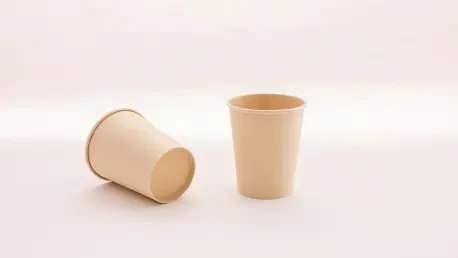Georgia-Pacific’s move towards revolutionizing the recycling industry through paper cup recycling initiatives is noteworthy. This expanding capability to incorporate polycoated paper cups in their recycling processes marks a significant advancement, addressing previous industry challenges presented by PE coatings. By developing an effective method to recapture fiber while screening out these coatings, Georgia-Pacific sets a precedent for the industry, demonstrating what is achievable through determined innovation and partnership. This endeavor points to the potential for a more sustainable future in recycling, signaling broader implications for the entire sector.
Strategic Partnerships Boost Recycling Initiatives
Georgia-Pacific’s alliances with the Foodservice Packaging Institute and the NextGen Consortium have been key in addressing the complexities of recycling polycoated paper cups. These partnerships serve as platforms for exchanging knowledge and resources, enhancing the industry’s capacity to adopt new recycling methods. The collaboration aims to overcome existing limitations by creating a comprehensive infrastructure that supports the recycling of these materials. Such teamwork has facilitated the acceptance of polycoated cups within recycling streams and contributed to the development of industry-wide standards that nurture recyclable solutions, addressing environmental challenges head-on.
This concerted effort extends beyond mere technical advancements, also involving advocacy and educational initiatives to promote widespread industry change. By fostering a network that prioritizes sustainable solutions, Georgia-Pacific and its partners are leading the charge toward widespread acceptance of paper cup recycling. This collaboration results in more robust recycling practices, inviting other industry stakeholders to align their methods with newer, more effective technologies. By championing these causes, Georgia-Pacific is playing a catalytic role, encouraging the industry to embrace more eco-friendly practices which are vital for future sustainability.
Technological Innovations at Georgia-Pacific Mills
Georgia-Pacific’s technological progress is best exemplified at its Savannah River paper mill, where polyethylene-coated cups have been successfully integrated into its recycling workflows. This advancement has positioned Georgia-Pacific as a frontrunner in transforming what typically would be regarded as post-consumer waste into valuable, reusable products. The sophisticated technology enables the robust separation of essential fibers from non-recyclable coatings, maximizing the utility of discarded paper cups. The implications of this innovation are vast, potentially redefining recycling practices across the industry.
Such technological prowess not only elevates Georgia-Pacific’s operations but also sets a benchmark for others seeking similar progress. By demonstrating that it is possible to recycle polycoated paper cups effectively, Georgia-Pacific is reshaping perceptions and practices around recycling. This breakthrough not only reinforces the company’s commitment to environmental stewardship but also inspires other industry players to rethink their recycling methodologies. By fostering an environment of continuous improvement and innovation, Georgia-Pacific’s efforts highlight the capabilities of technology in transforming waste management.
Industry Impact and Commitment to Sustainability
Georgia-Pacific’s leadership in recycling is driven by a commitment to reducing waste and promoting environmental sustainability. John Mulcahy emphasizes the urgent need to mitigate waste, underscoring Georgia-Pacific’s initiatives as vital to efficient resource consumption. The company’s recycling efforts reflect a dedication to environmental stewardship, positioning itself as an industry leader in fostering sustainable practices. This approach encourages others in the sector to examine and enhance their recycling protocols, collectively advancing the industry’s overall impact on the environment.
The significance of Georgia-Pacific’s contributions extends beyond individual corporate goals, resonating across the industry. By proactively addressing the challenges associated with recycling, the company showcases the potential for businesses to act as agents of change. The initiatives not only reduce the environmental footprint but also demonstrate the business viability of sustainability-focused operations. Mulcahy’s insights reveal a clear understanding of the balance between business interests and ecological responsibility, urging peers to adopt similar strategies for a cumulative industry benefit.
Future-Ready Solutions and Next-Gen Paper Cups
In pursuit of sustainable innovation, Georgia-Pacific is trialing “next-generation paper cups” that seek to replace traditional PE coatings with biobased materials. These materials promise to be both recyclable and compostable, offering an alternative that minimizes the environmental impact typically associated with conventional paper cups. This ambitious venture aligns with the company’s broader vision of developing eco-friendly solutions that facilitate recycling and reduce dependence on environmentally detrimental substances.
These future-forward trials are set to redefine industry standards and potentially spark an industry-wide shift towards more sustainable practices. By investing in the research and development of these next-gen materials, Georgia-Pacific is laying the groundwork for broader adaptation, appealing to both environmental and economic incentives within the industry. This focus not only represents a strategic move to ensure future growth and compliance but also sends a strong message about the industry’s evolving priorities, spearheaded by progressive enterprises dedicated to environmental responsibility through substantial innovation.
Expanding Recycling Accessibility
Georgia-Pacific is making significant strides in redefining the recycling industry by focusing on paper cup recycling initiatives. Traditionally, recycling polycoated paper cups has been a challenge due to their polyethylene (PE) coatings, which complicated the fiber recovery process. However, Georgia-Pacific’s innovative approach has developed a breakthrough technique to effectively extract valuable fibers while filtering out these problematic coatings. This advancement not only addresses a longstanding issue in recycling but also serves as a model for other companies in the industry. By showcasing what is possible through persistent innovation and strategic partnerships, Georgia-Pacific underscores the potential for widespread improvements in sustainability practices. These efforts have far-reaching implications, suggesting a shift towards a more sustainable and efficient future in recycling. This pivotal move reflects a broader trend within the sector, encouraging others to adopt similar practices for a cleaner environment and more responsible resource management.









